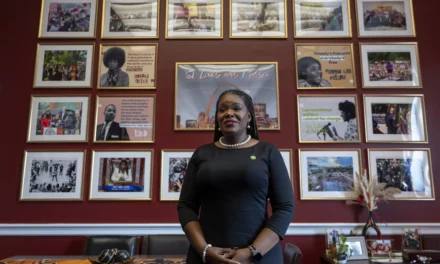We support our Publishers and Content Creators. You can view this story on their website by CLICKING HERE.

This time around, the ACLU shows no signs of backing off, particularly since Trump has once again made big promises to overhaul the border and immigration protocols.
ACLU leadership warned two days after the Nov. 5 election that the organization stood ready to take on Trump again.
“As Trump returns to the White House, we’re ready to return to the courts and Congress to fight for our civil liberties,” the group said in a statement last month.
“Starting on day one, we’re ready to fight for our civil liberties and civil rights in the courts, in Congress, and in our communities,” it continued. “We did it during his first term … and we’ll do it again.”
BORDER CZAR TOM HOMAN PREDICTS ‘COLLATERAL ARRESTS’ FROM TRUMP MASS DEPORTATION PLAN
Andrew R. Arthur, a former immigration judge who is a resident fellow in law and policy at the Center for Immigration Studies in Washington, said he anticipates that the ACLU will lead the charge among opposition groups.
“I anticipate that the ACLU will file challenges to anything that the second Trump administration does,” said Arthur, whose employer is nonpartisan but leans right on immigration issues. “I anticipate that there will be a variety of organizations and groups up to and including states that will attempt to push back … in this lawfare environment against every effort that the Trump administration makes to limit or to enforce the laws.”
Theresa Cardinal Brown, a senior adviser on immigration and border policy at the Bipartisan Policy Center in Washington, said the lawsuits have flown both ways under Democratic and Republican administrations with plenty of lawfare, a term for warfare through lawsuits.
President Joe Biden has faced many lawsuits from conservative groups and states since 2021, including by America First Legal, states such as Texas, and the Immigration Reform Law Institute.
“The litigation is happening in both directions,” Brown wrote in an email. “I think that the precedent of seeking judicial blocks of immigration policies is now the norm. With Congress failing to legislate, each president has taken farther reaching executive actions that are more susceptible to challenge.
“I will say that I would expect litigation against many of the executive actions taken by this administration, just as we saw during both the last time Trump was president and we also saw during Biden’s term,” Brown continued. “The litigants may change.”
Trump’s first term
Before Trump took office in January 2017, the ACLU filed legal injunctions against the incoming administration over his many promised plans, including to build a wall on the southern border.
In four years, the ACLU filed 434 legal actions against the Trump administration over the ways in which government proposals would cut off and interfere with the rights and liberties guaranteed to U.S. citizens and immigrants, regardless of whether they have entered the country legally.
In January 2017, Trump rolled out what has become known as the “Muslim ban,” an executive order that prohibited admission at airports, sea ports, and land ports of entry to any person from seven countries in the Middle East, the majority of which comprised mostly Muslim citizens. The ban, the ACLU successfully argued, discriminated against people based on religion.
By mid-2017, the ACLU sued the government over its attempted transgender military ban on enlisting service members on the basis that it violated due process and equal protection.
Later that first year, the ACLU filed an emergency lawsuit challenging the Trump administration policy that denied abortion services to unaccompanied immigrant children and teenagers who were pregnant and requested the procedure.
In February 2018, the group filed a lawsuit that sought to immediately reunite a mother who was separated from her daughter at the southern border under the zero-tolerance policy, which required adults to be prosecuted and children consequently taken from their parents and separated.
Fast forward to mid-2018, when the Trump administration disclosed it would include a question on the forthcoming 2020 decennial census on citizenship status. The ACLU sued on the basis that it would have chilled participation and scared people in mixed-immigration status families from filling out the survey.
Later that year, the ACLU and other organizations sued when the Trump administration rolled out changes to asylum that required asylum-seekers to remain in Mexico and barred other immigrants from making asylum claims if they had failed to do so in another country they passed through.
Finally, in 2019, the ACLU sued after Trump declared a national emergency and used that declaration as legal cover to transfer military and Treasury Department funding to the Department of Homeland Security to build a wall along the U.S.-Mexico border.
The second term
While Trump’s second term has yet to get underway, the ACLU is already looking at targeting Trump for how he wants to use the Alien Enemies Act of 1798 to deport illegal immigrants.
In a post online days before the election, the ACLU warned that a second Trump administration would employ this excuse for its at-large deportation operation.
“Donald Trump has promised to ‘carry out the largest domestic deportation operation in American history’ and, at recent campaign rallies, gone so far as to pledge that, if re-elected, he will invoke the Alien Enemies Act of 1798 to facilitate a draconian mass deportation program,” the ACLU wrote in a post on Oct. 31. “Though Trump made similar promises when in office, we know that his administration would be far more aggressive in its efforts to use this colonial-era law to deport millions.”
The law, it continued, was “used to justify World War II-era internment of noncitizens, and now Donald Trump is threatening to invoke the law to target immigrant communities.”
Trump’s other purported policies are also likely to face legal action from the ACLU, including an executive order to reimplement the Remain in Mexico policy, build more border wall, expand immigration detention facilities, expand who can be arrested within the United States by immigration officers, and more.
The Trump transition team is looking at where it can house thousands to hundreds of thousands of illegal immigrants at a time as it makes arrests nationwide and then must wait for immigration judges to order people in custody deportable.
Although the Trump and Biden administrations have both used pop-up tents on the border to temporarily detain immigrants in custody, the flimsy tents are seen as not suitable or secure for adults awaiting deportation.
Trump has also threatened to carry out arrests by schools, hospitals, courthouses, and churches — all venues that have historically been off-limits to U.S. Immigration and Customs Enforcement. If ICE does move in to arrest immigrants as they are leaving a court proceeding or exiting a hospital, it could face legal retribution from immigrant rights groups.
On a foreign policy level, Trump could impose sanctions or rescind foreign aid to countries, including Venezuela, that will not take back their own citizens from the U.S., as transition team officials and advisers have told the Washington Examiner is being mulled over.
Trump also wants to tear up the CBP One phone app, a government app that allows immigrants in Mexico to apply for an appointment with a U.S. customs officer at a port of entry. The hope in rolling out the app two years ago, halfway through Biden’s term, was to encourage people not to enter the U.S. between the ports of entry, which is considered an illegal entry.
But Republicans have fought the CBP One app, saying that it sets people up to be paroled into the country by the hundreds of thousands rather than a one-by-one basis as parole was intended to be used.
CLICK HERE TO READ MORE FROM THE WASHINGTON EXAMINER
All of these plans could face lawsuits from the ACLU and other parties, particularly given that some faced legal action when Trump tried to implement them in his first term.
The ACLU “definitely [has] a very different view of how the law should be interpreted and applied,” Arthur said. “For that reason, I anticipate that they will challenge [Trump] potentially to slow them down. But I have to assume that they’re doing [it] in good faith. I just don’t know that they have the backside of the guard.”

 Conservative
Conservative  Search
Search Trending
Trending Current News
Current News 





